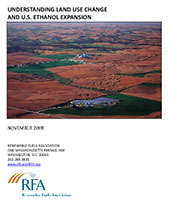Nov 17 2008
A debate has been raging over the past several of months about how best to use the world’s arable land in light of our changing climate. Practical and reasonable solutions to address climate change are unfortunately being lost in the politics of land use and the impact of biofuels on land use. The following report and additional information provide an important perspective on this debate.

A recent column by Robert C. Brown, director of the Bioeconomy Institute at Iowa State University, points out that “expansion of agriculture” does not have to mean cutting or burning down rainforests. In fact, Brown says ”...there is no scientific evidence indicating that deforestation is driven by biofuels production.”
Making a similar point, the Renewable Fuels Association (RFA) released a report this week systematically refuting claims that ethanol production will divert land from agricultural use. The report stresses the fact that agricultural land can expand without “jeopardizing forest or other sensitive lands.”
The report also gives historical context to global agricultural land use as well as the impact of increased grain demand on sustainability and the role of the ethanol co-product distillers grains used for animal feed.
Additionally, RFA president & CEO Bob Dinneen posted and article to The Huffington Post on the land use change issue. Dinneen points to “political agendas, dubious motives, questionable science, wild rhetoric, and unrealistic expectations” as dominating the discussion and detracting from the more pressing issues at hand. He also refers to the science behind land use change as “elusive”.
A good amount of land can be brought into agricultural production, the post says, without having significant impact on the environment. He references a Stanford University study in which a team of researchers found that “an area of abandoned agricultural land half the size of the continental U.S. could be brought into production with minimal impact on the environment.”